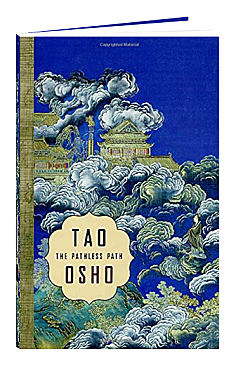Tao: The Pathless Path

Tao: The Pathless Path
Book — Also available in other formats: AudioBook
In his commentaries on five parables from "The Lieh Tzu" Osho brings a fresh and contemporary interpretation to the ancient wisdom of Tao. Lieh Tzu was well known a Taoist master of the 4th century B.C., and his sly critiques of Confucius provide abundant opportunities for the reader to explore the contrasts between the rational and irrational, the male and the female, the structured and the spontaneous.
The chapters in this beautiful little paperback are selections from a longer series of talks given under the same name, with an additional chapter of responses to questions. If you feel drawn to the "watercourse way" of Tao, with its approach of let-go and harmony with nature, this is a book you will especially enjoy.
Chapter Titles
#1: Voluntary Death
#2: Sublime Laziness
#3: Joy Has No Cause
#4: No Bargain with Reality
#5: There Can Be No Regret
#6: I Am a Cross to You
#7: Choose the New
#8: Putting Shoes on a Snake
#9: Only Forgotten
#10: You Are Blessed
#11: Reality: That Which Works
#12: This Is Not Kaaba
#13: Inner Integrity
#14: Just Give Way
Details
Timeless Taoist stories retold for the 21st century, with an emphasis on lessons about true happiness and true understanding.
Excerpt from: Tao: The Pathless Path
"A Taoist parable:
"There is a statue of Lao Tzu, the founder of Tao. And a young man has been thinking for years to go to the mountains and see the statue of Lao Tzu. He loves the words, the way Lao Tzu has spoken, the style of life that he has lived, but he has never seen any of his statues. There are no Taoist temples, so there are very rare statues and they are all in the mountains – standing in the open, carved out of the mountain – no roof, no temple, no priest, no worship.
"And years pass, and there are so many things always coming in between. But finally one night he decides that he has to go – and it is not that far, only a hundred miles – but he is a poor man, and he has to walk. In the middle of the night – he chooses the time in the middle of the night so that the wife and the children and the family are asleep and no trouble arises – he takes a lamp in his hand, because the night is dark, and goes out of the town.
"As he comes out of the town to the first milestone, a thought arises in him, ‘My God, one hundred miles! And I only have two feet – it is going to kill me. I am asking the impossible. I have never walked one hundred miles, and there is no road….’It is a small hill path, a footpath – dangerous too. So he thinks, &lsquot;It is better to wait till the morning. At least there will be light, and I can see better; otherwise I will fall somewhere off this small footpath. And without seeing the statue of Lao Tzu, simply be finished. Why commit suicide?’
"So he was sitting just outside the town, and as the sun was rising an old man came by. He saw this young man sitting; he asked, ‘What are you doing here?’The young man explained:
"The old man laughed. He said, ‘Have you not heard the ancient saying? Nobody has the power to take two steps together, you can take only one step at a time. The powerful, the weak, the young, the old – it doesn’t matter. And the saying goes, Just one step by one step, a man can go ten thousand miles – and this is only a hundred miles! You seem to be stupid. And who is saying to you that you should go continuously? You can take time; after ten miles you can rest a day or two days, enjoy. This is one of the most beautiful valleys and the most beautiful mountains and the trees are so full of fruits, fruits that you may not have even tasted. Anyway, I am going; you can come along with me. I have been on this path thousands of times, and I am at least four times your age. Stand up!’
"The man was so authoritative: when he said ‘Stand up!’ the young man simply stood. And he said, ‘Give your things to me. You are young, inexperienced; I will carry your things. You just follow me, and we will take as many rests as you want.’
"And what the old man had said was true – as they entered deeper into the forest and the mountains, it became more and more beautiful. And wild, juicy fruits…and they were resting; whenever he wanted, the old man was ready. He was surprised that the old man himself never said it was time to rest. But whenever the young man said it was time to rest, he was always willing to rest with him – a day or two, and then they would start the journey again.
"Those one hundred miles just came and went by, and they reached one of the most beautiful statues of one of the greatest men who has ever walked on the earth. Even his statue had something – it was not just a piece of art, it was created by Taoist artists to represent the spirit of Tao.
"Tao believes in the philosophy of let-go. It believes you are not to swim, but just to flow with the river, allow the river to take you wherever it is going – because every river ultimately reaches to the ocean. So don’t be worried, you will reach the ocean. There is no need to be tense.
"In that lonely spot the statue was standing, and there was a waterfall just by the side – because Tao is called the watercourse way. Just as the water goes on and on flowing with no guidebooks, with no maps, with no rules, no discipline… but strangely enough in a very humble way, because it is always seeking the lower position everywhere. It never goes uphill. It always goes downhill, but it reaches to the ocean, to its very source.
"The whole atmosphere there was representative of the Taoist idea of let-go. The old man said, ‘Now begins the journey.’
"The young man said, ‘What? I was thinking, one hundred miles and the journey is finished.’
"The old man said, ‘That is just the way the masters have been talking to people. But the reality is now – from this point, from this atmosphere, a journey of one thousand and one miles begins. And I will not deceive you, because after one thousand and one miles you will meet another old man – perhaps me – who will say, ‘This is just a stopover, go on.’Go on is the message.’
"The journey itself is the goal.
"It is infinite. It is eternal." Osho
In this title, Osho talks on the following topics:
love... tao... knowledge... ego... answer... life... energy... confucius... gurdjieff... einstein...
Details
More Information
Type Series of Talks
Publisher Renaissance Books
ISBN-13 978-1580632256
Dimensions (size) 14 x 1,1 x 21,6 cm
Number of Pages 192
- Log in to post comments
- 93 views
